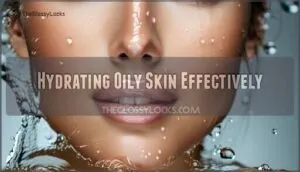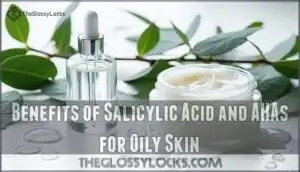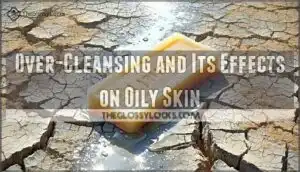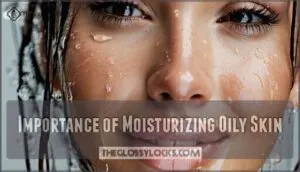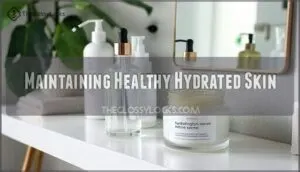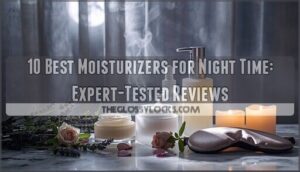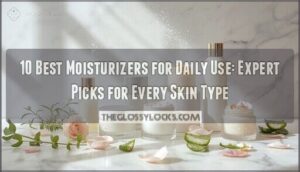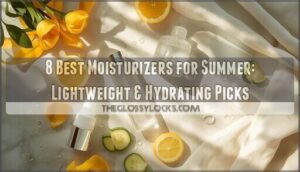This site is supported by our readers. We may earn a commission, at no cost to you, if you purchase through links.

Start with a lightweight, oil-free moisturizer—look for ingredients like hyaluronic acid or niacinamide, which lock in moisture without clogging pores.
Gel-based moisturizers are fantastic too, offering hydration without that greasy feeling.
Don’t shy away from hydrating toners or serums, especially those labeled non-comedogenic.
Drinking enough water is essential, but your diet can play a role, too—think foods rich in antioxidants.
And here’s a twist: over-cleansing can backfire, leaving your skin thirstier.
Find the right balance, and your oily skin can stay hydrated and glowing!
Table Of Contents
- Key Takeaways
- Hydrating Oily Skin Effectively
- Choosing Right Ingredients
- Top 6 Oily Skin Hydrators
- Common Mistakes to Avoid
- Maintaining Healthy Hydrated Skin
- Frequently Asked Questions (FAQs)
- How to best hydrate oily skin?
- How do you fix dehydrated oily skin?
- What are the best hydrating ingredients for oily skin?
- Which moisture is best for oily skin?
- Can oily skin benefit from facial oils?
- Does stress impact hydration levels in oily skin?
- Are probiotics helpful for oily skin hydration?
- How does pollution affect oily skin hydration?
- What role does sleep play in skin hydration?
- Conclusion
Key Takeaways
- Look for lightweight, oil-free products with hydrating ingredients like hyaluronic acid and niacinamide to balance moisture without clogging pores.
- Avoid over-cleansing and harsh cleansers since stripping natural oils can trigger dehydration and excess oil production.
- Use sunscreen daily to protect your skin while maintaining hydration; opt for non-comedogenic, gel-based formulas.
- Stick to a consistent skincare routine with hydrating toners, gel-based moisturizers, and weekly gentle exfoliation for better absorption and balanced skin.
Hydrating Oily Skin Effectively
You might think oily skin doesn’t need hydration, but skipping moisturizer can actually make things worse.
By choosing lightweight, water-based products, you can keep your skin balanced and prevent it from overproducing oil.
Importance of Balancing Oil Control and Hydration
Balancing oil control and hydration is essential for oily skin. Stripping too much sebum can damage your skin barrier, leaving it dehydrated. Instead, focus on lightweight hydration to keep your skin balanced and healthy.
- Use an oily skin moisturizer with hyaluronic acid to replenish water.
- Avoid over-drying cleansers; they trigger excess oil.
- Stick to balanced skincare with non-comedogenic products.
Understanding Dehydrated Oily Skin
Oily skin can still be dehydrated, which results when water, not oil, is lacking.
Dehydrated oily skin craves water, not oil—restore balance with lightweight hydration to keep your skin healthy, radiant, and shine-free.
Dehydration causes your skin to compensate by overproducing sebum, leading to shine and clogged pores.
This often happens due to a damaged skin barrier or poor skincare habits.
Focus on oily skin hydration methods to restore balance and support healthy skin moisture without triggering excess oil.
Role of Hyaluronic Acid and Niacinamide in Hydration
Think of hyaluronic acid (HA) as your skin’s sponge, boosting water retention without greasiness.
Pair it with niacinamide for a dream team combo—this vitamin B3 superstar reduces redness, controls shine, and enhances hydration.
Layer these in your serum combinations for ingredient synergy. Consider buying quality serums for better results.
The right product layering guarantees oily skin hydration stays balanced. It’s skincare magic!
Choosing Right Ingredients
To keep your oily skin hydrated without clogging pores, focus on lightweight, water-based ingredients that support moisture balance.
Look for proven options like hyaluronic acid, niacinamide, and aloe, and skip heavy oils that can trap excess sebum.
Benefits of Salicylic Acid and AHAs for Oily Skin
Salicylic acid and AHAs are game-changers for oily skin. They’re pros at multitasking! Want proof?
- Exfoliation Benefits: AHAs polish the surface while salicylic acid dives deep into pores.
- Pore Minimization: Together, they reduce clogged pores, cutting breakouts.
Salicylic acid is a beta-hydroxy acid targeting oily skin.
- Skin Renewal & Oil Control: Salicylic acid balances oil and soothes inflammation, leaving skin refreshed.
Results? Hydrated, happier skin!
How Aloe and Vitamin C Contribute to Skin Hydration
Aloe hydration and vitamin C benefits go hand in hand, creating an antioxidant synergy that’s perfect for oily skin hydration.
Aloe attracts moisture, while vitamin C boosts collagen and strengthens your skin barrier.
Together, these skin hydration ingredients soothe, protect, and support cellular repair.
For enhanced protection, consider ingredients with natural sunscreen options.
Add them to your routine for smoother, hydrated skin without clogging pores—simple, effective hydration tips!
Avoiding Heavy Ingredients Like Coconut Oil
Heavy skincare ingredients, like coconut oil, can be pore-clogging culprits for oily skin.
Opt for noncomedogenic alternatives, such as jojoba or squalane, which mimic natural oils without clogging pores.
Look for product formulations focused on lightweight hydration and carefully sourced skincare ingredients. Prioritizing alternative emollients in your routine guarantees balance and boosts effective oily skin hydration methods for healthier skin.
Top 6 Oily Skin Hydrators
Finding the right hydrator for oily skin can feel like solving a tricky puzzle, but it doesn’t have to be complicated.
These six products balance hydration and oil control, leaving your skin fresh, healthy, and shine-free.
1. ANUA Niacinamide TXA Serum for Radiant Skin

If you’re battling oily skin and uneven tone, ANUA Niacinamide TXA Serum could be your secret weapon.
Packed with 10% niacinamide and 4% tranexamic acid, it tackles dark spots and refines texture without feeling greasy.
It’s lightweight, absorbs quickly, and layers nicely with other products.
Plus, its 10 types of hyaluronic acid bring moisture across your skin’s layers.
You’ll notice clearer, calmer skin with minimized pores.
Bonus? It’s fragrance-free and friendly for sensitive skin, making it a daily skincare essential!
Best For: Individuals with oily or sensitive skin looking to improve uneven tone, reduce dark spots, and minimize pores.
- Lightweight, non-greasy formula that absorbs quickly.
- Reduces dark spots and brightens skin tone effectively.
- Fragrance-free and suitable for all skin types, including sensitive skin.
- Results may vary depending on the severity of pigmentation.
- Higher price point compared to similar products.
- Some users may need several weeks to see noticeable changes.
2. La Roche-Posay Gentle Cleanser for Sensitive Skin
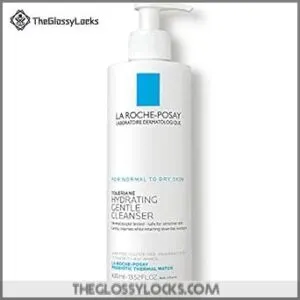
With La Roche-Posay Gentle Cleanser, you’re pampering your skin while addressing hydration needs.
Infused with niacinamide and ceramides, it soothes, strengthens, and maintains your skin’s natural barrier.
Its creamy, non-foaming formula is perfect for sensitive skin, gently cleansing dirt and makeup without stripping moisture.
Soap-free, fragrance-free, and non-comedogenic, this cleanser guarantees comfort for even the most delicate skin types.
Though it’s not a deep pore cleanser, its calming touch is ideal for those prioritizing hydration and balance over harsh scrubbing.
Best For: Individuals with normal to dry, sensitive skin looking for a gentle, hydrating cleanser for daily use.
- Contains niacinamide and ceramides for soothing and strengthening skin.
- Maintains skin’s natural moisture barrier and pH balance.
- Fragrance-free, soap-free, and non-comedogenic, making it ideal for sensitive skin.
- Does not provide deep pore cleansing or exfoliation.
- May require extra effort to remove heavy makeup like mascara.
- Higher price compared to some drugstore alternatives.
3. CeraVe Moisturizing Cream for Dry Skin
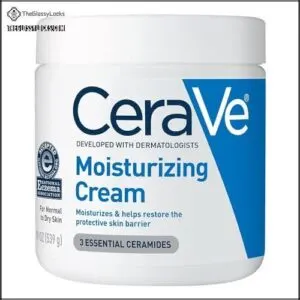
CeraVe Moisturizing Cream proves you can’t judge a product by its name.
While designed for dry skin, its lightweight, non-greasy formula works wonders for oily skin, hydrating without clogging pores.
Packed with hyaluronic acid and ceramides, it locks in moisture and strengthens your skin’s barrier—ideal for oily skin prone to dehydration.
Developed with dermatologists, it’s fragrance-free, gentle, and non-comedogenic.
Whether you use it on your face or body, this versatile cream absorbs quickly, delivering long-lasting hydration and balanced, healthier skin, providing long-lasting hydration.
Best For: Those with dry, sensitive, or acne-prone skin seeking a versatile, dermatologist-approved moisturizer for long-lasting hydration.
- Provides 24-hour intense hydration with a lightweight, non-greasy formula.
- Gentle, fragrance-free, and non-comedogenic, suitable for sensitive skin.
- Contains hyaluronic acid and ceramides to restore the skin barrier.
- Tub packaging is less hygienic compared to pump options.
- May take time to fully absorb into the skin.
- Can feel too rich for very oily skin types.
4. La Roche-Posay Clay Mask Oily Skin
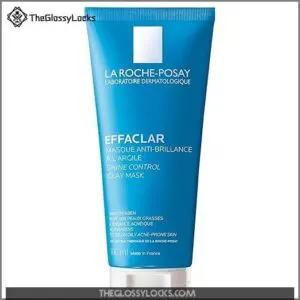
La Roche-Posay’s Clay Mask is a game-changer for oily skin.
It absorbs excess oil, controls shine, and removes impurities like dust and pollution.
With kaolin clay, glycerin, and panthenol, this mask keeps skin matte without drying it out.
Testers love its soft, smooth finish and report fewer blackheads after regular use.
For those seeking alternatives, consider masks with exfoliating salicylic acids.
Apply it 1-2 times weekly, leaving it on for 5-10 minutes.
Perfect for sensitive or acne-prone skin, it’s an affordable and effective way to refresh and balance oily complexions.
Best For: People with oily, combination, and sensitive skin looking to control shine, reduce blackheads, and refresh their complexion without dryness.
- Mixed opinions on pore-reducing effectiveness.
- Takes slightly longer to dry compared to similar products.
- Some users prefer a thicker consistency.
- Effectively absorbs excess oil and controls shine.
- Leaves skin feeling soft, smooth, and refreshed.
- Non-drying and suitable for acne-prone and sensitive skin.
5. Murad Clarifying Toner Oil Control
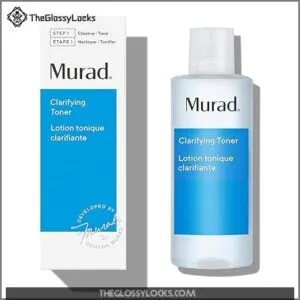
One powerful ally for oily skin is the Murad Clarifying Toner.
It’s like a mini spa for your face, packed with witch hazel, which minimizes pores, and cucumber extract to cool and calm.
Algae extract keeps oil production in check, while grape seed extract and vitamin E neutralize free radicals.
Use it after cleansing to sweep away impurities, balance your skin’s pH, and reduce shine, making it a practical pick for tackling excess oil without drying you out, and it works wonders.
Best For: People with oily, acne-prone, or combination skin looking to control shine and maintain a balanced complexion.
- Instantly removes oil and impurities, reducing shine.
- Contains soothing ingredients like cucumber extract for sensitive skin.
- Long-lasting formula suitable for daily use.
- May cause temporary redness as skin adjusts.
- Not suitable for dry skin types.
- Requires consistent use for long-term results.
6. Caudalie Premier Cru Anti Aging Cream
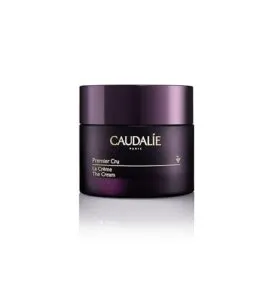
Caudalie Premier Cru Anti Aging Cream is your secret weapon for oily, aging skin.
With TET8 technology, it reduces wrinkles, improves elasticity, and delivers deep hydration thanks to hyaluronic acid.
Enriched with organic shea butter and grape seed oil, it soothes without feeling greasy.
Surprisingly, it even tackles oily skin’s flare-ups while keeping hydration levels ideal.
The light rosewater scent feels luxurious yet fades quickly.
Plus, its refillable packaging means it’s kind to the planet and your budget—beauty and brains in a jar, offering a perfect blend of luxurious feel and practicality.
Best For: Adults with aging or oily skin seeking a luxurious, eco-friendly cream to target wrinkles, dark spots, and hydration.
- Improves elasticity and reduces wrinkles with TET8 technology.
- Hydrates deeply without feeling greasy, suitable for oily and sensitive skin.
- Environmentally friendly refillable packaging.
- Scent may be too strong or old-fashioned for some users.
- Absorption takes around 15 minutes, which may not suit quick routines.
- Considered pricey compared to other creams.
Common Mistakes to Avoid
It’s easy to make mistakes when taking care of oily skin, especially if you think skipping moisturizer or scrubbing too much will help.
Understanding these common missteps can save your skin from irritation, excess oil, and dehydration.
Over-Cleansing and Its Effects on Oily Skin
Overcleansing might feel like the answer to oily skin, but it’s a one-way ticket to trouble. Stripping natural oils can trigger increased oil production, leaving you with dehydrated skin and an upset skin barrier.
One should also consider dietary influences on sebum, as these can also affect oil production.
Watch out for these common mistakes:
- Washing more than twice daily
- Using harsh cleansers
- Skipping gentle moisturizers
- Ignoring skin barrier health
- Over-exfoliating
Importance of Moisturizing Oily Skin
Moisturizing oily skin might seem counterintuitive, but skipping it leads to oily dehydration, triggering more sebum production.
A well-chosen moisturizer helps restore skin balance by boosting hydration benefits without clogging pores. Lightweight, water-based moisturizers are ideal, offering oily skin hydration importance without heaviness.
Remember, skin hydration is essential for maintaining health and avoiding dryness disguised beneath the oil. Embrace moisture!
How Hot Showers and Baths Affect Skin Hydration
Steamy showers may feel heavenly, but that high heat can throw your skin into chaos.
Elevated temperatures strip natural oils, disrupt your skin barrier, and boost transepidermal water loss, leaving dehydrated skin gasping for moisture.
Heat & sebum go hand-in-hand, meaning excess oil might follow.
Opt for lukewarm baths, then focus on hydration aftercare to lock in moisture and repair damage.
Maintaining Healthy Hydrated Skin
Keeping your oily skin hydrated doesn’t have to be complicated, but it does require the right habits.
By focusing on a consistent skincare routine, a balanced diet, and proper sun protection, you can support your skin’s health and maintain its moisture levels.
Lifestyle Changes for Better Skin Hydration
A few lifestyle tweaks can boost hydration.
Improve sleep quality—your skin repairs overnight.
Exercise increases circulation and glow, but hydrate before and after.
Reduce stress; it’s an oil production trigger.
Keep air quality in check with a humidifier, especially in dry seasons.
Balance water intake—it’s internal hydration gold.
These small changes create big wins for oily, hydrated skin.
Dietary Recommendations for Hydrated Oily Skin
Boost your skin’s glow by embracing a hydrating diet.
Focus on foods packed with water and nutrients to keep your skin happy.
- Hydrating Foods: Snack on watermelon, cucumbers, or citrus fruits.
- Omega-3 Fatty Acids: Add salmon or walnuts for healthy fats and controlled oil.
- Antioxidant Benefits: Eat spinach and berries to combat free radicals.
Keep sipping water throughout the day!
A balanced diet can help manage excess sebum production.
Regular Skincare Routines for Oily Skin Hydration
When building your oily skin hydration routine, stick to consistent routines with gentle exfoliation to avoid stripping your skin barrier.
Use lightweight moisturizers that won’t clog pores, and include hydrating masks weekly for added moisture.
For those seeking specialized products, consider exploring options for best oily skin moisturizers.
These simple oily skin care steps enhance hydration without excess oiliness, and practical hydration methods keep your skin smooth, balanced, and glowing.
Importance of Sunscreen in Hydration and Protection
Sunscreen isn’t just for sunburns—it’s your oily skin’s secret hydration weapon.
Lightweight, gel-based sunscreens hydrate without clogging pores, while offering UV protection against photoaging and skin damage.
Look for broad-spectrum ingredients like zinc oxide or niacinamide, which strengthen your skin barrier and lock in moisture.
To prevent clogged pores, be sure to choose non-comedogenic formulas.
For glowing, balanced skin, never skip sunscreen—your future self will thank you!
Frequently Asked Questions (FAQs)
How to best hydrate oily skin?
Surprisingly, oily skin can still be dehydrated.
Use lightweight, water-based products like gel moisturizers with hyaluronic acid.
Add niacinamide to balance oil and hydrate deeply.
Skip heavy creams, and drink plenty of water!
How do you fix dehydrated oily skin?
To fix dehydrated oily skin, use gentle cleansers, hydrating toners with glycerin, lightweight water-based moisturizers, and serums with hyaluronic acid.
Drink plenty of water, avoid over-cleansing, and exfoliate weekly to improve absorption and hydration.
What are the best hydrating ingredients for oily skin?
Hyaluronic acid, niacinamide, aloe vera, and glycerin are your best friends for hydrating oily skin.
They lock in moisture without clogging pores, balance oil production, and leave your skin feeling fresh, not greasy, with hyaluronic acid being a key component.
Which moisture is best for oily skin?
Did you know hyaluronic acid holds up to 1,000 times its weight in water?
It’s perfect for oily skin.
Pair it with a lightweight, gel-based moisturizer to balance hydration without triggering excess oil.
Can oily skin benefit from facial oils?
Yes, oily skin can benefit from facial oils, especially non-comedogenic ones like jojoba or squalane.
They mimic natural skin oils, helping restore balance, lock in moisture, and even reduce excess sebum production over time.
Does stress impact hydration levels in oily skin?
Stress can mess with your skin, even if it’s oily.
It triggers hormone changes, increasing oil production while dehydrating your skin by weakening its moisture barrier.
So, managing stress isn’t just good for your mood—it helps your face too, by improving your overall skin health through better management of its effects.
Are probiotics helpful for oily skin hydration?
Probiotics act like peacekeepers for your skin, balancing the microbiome and calming inflammation.
They don’t directly hydrate oily skin but support a healthier barrier, helping it retain moisture and manage oil production more effectively.
How does pollution affect oily skin hydration?
Pollution strips your skin’s natural moisture, clogs pores, and triggers excess oil production as a defense.
This imbalance dehydrates oily skin, leaving it shiny yet thirsty.
Protect with gentle cleansers, antioxidants, and a lightweight moisturizer.
What role does sleep play in skin hydration?
Think of sleep as your skin’s recharge button.
While you rest, your body boosts hydration, repairs skin cells, and balances moisture levels.
Lack of sleep? That’s a recipe for dull, dehydrated, and stressed skin.
Conclusion
Balancing hydration and oil control is key to keeping oily skin healthy and glowing.
Use lightweight, oil-free products with hydrating ingredients like hyaluronic acid and niacinamide, and avoid over-cleansing, which can strip essential moisture.
Don’t skip sunscreen—it protects and helps maintain hydration.
Pair a consistent skincare routine with a diet rich in antioxidants and proper hydration from water, and by following these skin hydration methods for oily skin, you can achieve the perfect harmony of hydration and balance.
- https://go.skimresources.com/?id=31268X888966&xs=1&url=https%3A%2F%2Fwww.qureskincare.com%2Fpages%2Fmicroinfusion
- https://www.michelegreenmd.com/
- https://www.instagram.com/dr.coreyhartman/
- https://www.drhadleyking.com/
- https://hamsaradiance.com/blogs/glowing/salicylic-acid-a-powerful-solution-for-oily-skin-and-clogged-pores

